新通用大学英语教程3unit01
全新版大学英语综合教程3Unit
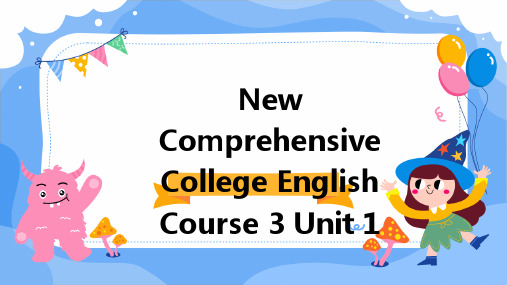
Complete the following sentence: "Effective communication requires a combination of _____ and _____.
题目1
Fill in the blanks in the following paragraph: "In order to improve my speaking ability, I need to _____, _____, and _____.
01
Overview of the text
Themes
The text is centered around themes of cultural differences, globalization, and the challenges and opportunities that come with living in a diverse world.
Words and Phrases
复杂句型分析
在Unit 1中,有许多复杂的句型,如复合句、并列句等。学生需要通过分析句子结构,理解这些句子的含义和作用。此外,学生还应该学习如何运用这些句型,以提高自己的英语表达能力。
Sentence Analysis
长句子的理解
在Unit 1中,有许多长句子需要学生理解。这些长句子往往包含多个从句和修饰语,结构复杂。学生需要通过仔细阅读和分析,理解这些句子的含义和逻辑关系。同时,学生还应该学会如何拆分这些长句子,以方便理解和记忆。
写作技能
1
2
3
学会快速阅读、跳读、推理判断等技巧,提高阅读效率。
掌握阅读技巧
能够概括文章大意,理解作者意图,抓住关键信息。
全新版大学英语阅读教程(通用本第三册)答案(1)

Unit 11.A White HeronComprehension Exercises1Decide on the best choice to answer or complete each of the following.1.A2. B3. C4. D5. A2Give brief answers to the following questions.1. Sylvia was living in the woods with her grandmother.2. He was a scientist who collected birds. He was looking for a heron.3. It was love.4. Because Sylvia could show the man where the heron was.5. Y es, she knew the forest well.6. The heron was living happily in the forest and was as much part ofnature as she herself. They had together watched the sea and the morning. She could not tell its secret and give its life away.2.The Nutrients in FoodComprehension Exercises1Decide on the best choice to answer or complete each of the following.1.A2. B3. A4. A5. C2Give brief answers to the following questions.1.Because they provide the body with heat and energy.k and hard cheese.3.Proteins are necessary for life. They can build and repair body tissues. They are animportant part of muscles, organs, skin and hair.4.Some nutrients provide fuel for energy, some build body tissues and some help controldifferent processes of the body.5.If a person does not have enough iron, the person will get a disease called anemia.3.Creativity Will Dominate Our TimeComprehension Exercises1Decide on the best choice to answer or complete each of the following.1. D2. C3. C4. C 4. C2 Put the following into Chinese.1. 历史上周期性地出现一些大的转折时期,在这些转折时期―工作‖的含义发生了变化。
全新大学英语第三册Unit1LanguagePoints
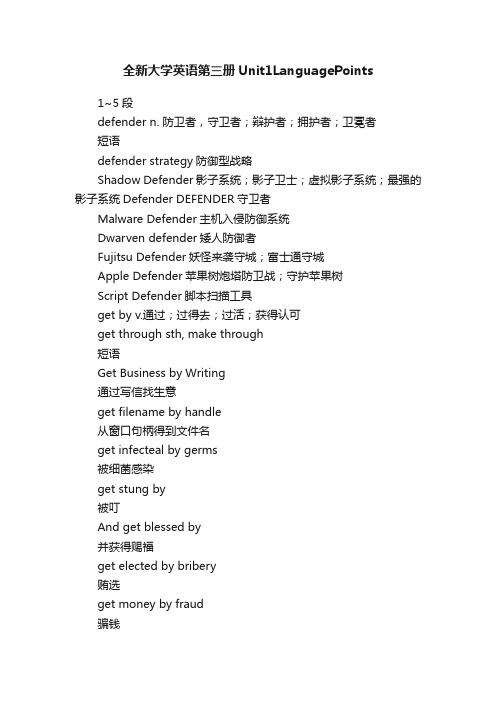
全新大学英语第三册Unit1LanguagePoints1~5段defender n. 防卫者,守卫者;辩护者;拥护者;卫冕者短语defender strategy防御型战略Shadow Defender影子系统;影子卫士;虚拟影子系统;最强的影子系统Defender DEFENDER守卫者Malware Defender主机入侵防御系统Dwarven defender矮人防御者Fujitsu Defender妖怪来袭守城;富士通守城Apple Defender苹果树炮塔防卫战;守护苹果树Script Defender脚本扫描工具get by v.通过;过得去;过活;获得认可get through sth, make through短语Get Business by Writing通过写信找生意get filename by handle从窗口句柄得到文件名get infecteal by germs被细菌感染get stung by被叮And get blessed by并获得赐福get elected by bribery贿选get money by fraud骗钱get juice by pounding捣取汁frustrationn.心理挫折短语frustration tolerance挫折耐力;挫折容忍力act frustration行动挫折Frustration Aggression挫折攻击;攻击Frustration Man出气筒Barrier Frustration训犬中的阻绝挫折感commercial frustration商业落空geometrical frustration几何阻挫Nesting frustration筑巢失败suburbansuburban district郊区suburban area近郊区域;附廓区suburban railway市郊铁路;郊外铁路suburban adj.1. 郊区的,市郊的,近郊的2. 是郊区特性的,有郊区人特点的3. 土气的;褊狭的;乏味的;古板的contentment n. 满足;满意短语Achieving contentment知足常乐restiveness<>contentment不安宁;不安静的Happy contentment at school校园中的喜悦Contentment brings happiness.知足者常乐Happiness consists in contentment幸福在于知足;知足常乐Contentment is natural wealth知足是天然的财富;知足是天赐的财富Happiness lies in contentment知足长乐sound of contentment自安之声In great contentment巨大的满足Happiness consists in contentment .幸福在乎知足。
新标准大学英语三unit1
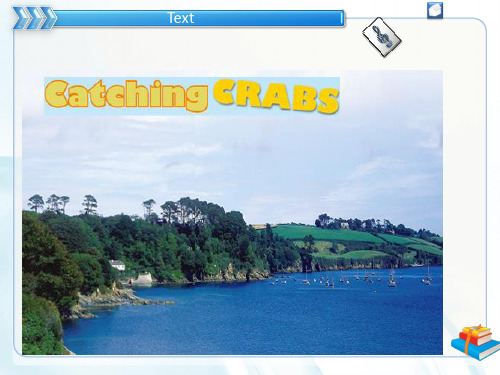
Text
Most important of course were the final exams in April and May in the following year. No one wanted the humiliation of finishing last in class, so the peer group pressure to work hard was strong. Libraries which were once empty after five o'clock in the afternoon were standing room only until the early hours of the morning, and guys wore the bags under their eyes and their pale, sleepy faces with pride, like medals proving their diligence.
25
bored with this game."
Text
Not only did the crab give up its lengthy struggle to escape, but it actually began to help stop other crabs trying to escape. He'd finally chosen an easy way of life. 28 Suddenly I understood why my father had suggested catching crabs that morning. He looked at me. "Don't get pulled back by the others," he said. "Spend some time figuring out who you are and what you want in life.
全新版大学英语3 Unit 1 changes in the way we live
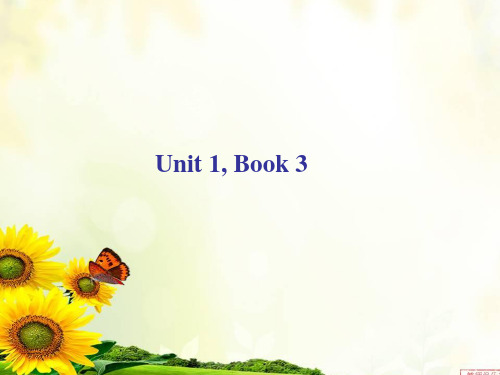
1) One topic S + several detail Ss 2) The detail Ss run parallel to each other
3. Language points
• 1) …but I’m getting by (line 3). • get by: be good enough but not very good; manage to live or do things. • E.g. I cannot get by on such a small income.
4
Master the key language points and grammatical structures
Discussion: 1) Why is “agritainment” increasingly popular nowadays? regional folklore culture;
freelance • 2) Does he like living in the city? frustration • 3) What are the two things that the writer has always wanted to do? write and live on a farm • 4)Why does the writer think that his life in the country self-reliant and satisfying?
• Exercise: got round to • a) He _______________ going back home in country after the busy period. • b) We’ve stored enough food and fuel to _______ • The cold winter. • c) It’s a bit hard for the old people to _________ • on a small pension. • d) The teller had been stealing money from the bank and get away with _____________________ it. • e) She cann’t ____________her shyness. • f) Did your speech ______________ to the students? get across get by get through
新通用大学英语综合教程3-unit1课后答案和课件

Part 2 Etiquette
Listen to the conversations and circle the correct answers.
1. It is ______ to use first names at this office.
A. impolite
B. taboo
C. customary
What subjects were discussed?
table manners greetings dress and clothing male and female behavior taboos offensive behavior punctuality language
Agenda
Lesson 1
UNIT GOALS 1. Meet someone and make small talk 2. Be culturally literate 3. Discuss how culture changes over time 4. Write about cultural differences
Marie: Yes. Paris, actually. Mrs. Beatty: That’s nice. 3_____I_t _su_r_e__is_a__b_e_a_u_ti_fu_l_d_a_y___, iБайду номын сангаасn’t it?
Marie: Mmm-hmm.
Listening
3 Part 1 A Business Meeting in Thailand Part 2 Etiquette
3 Part 3 Being Culturally Literate Part 4 Understanding Culture
新编英语教程第三册unit1 ppt课件
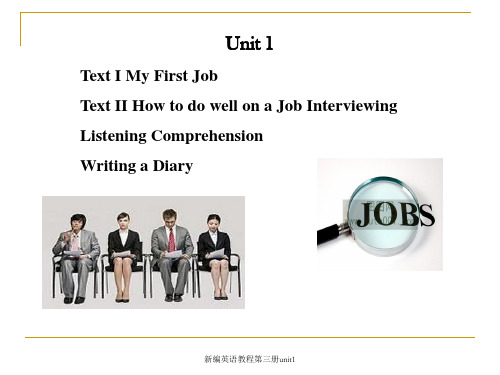
Choose a job you love, and you will never have to
work a day in your life. - Confucius
好之者不如乐之者。——出自《论语·雍也》
新编英语教程第三册unit1
If you have a job without any aggravations, you don’t have a job.
新编英语教程第三册unit1
What kind of personal qualifications do you think you should have? Mature, competent, experienced reliable, honest, responsible creative, highly-motivated Independent, resourceful Ambitious, aggressive Energetic, open-minded Sociable, selfless/unselfish
新编英语教程第三册unit1
Step 2 Reading famous sayings
There are no menial (humble) jobs, only menial attitudes.
- William J. Bennett
The supreme accomplishment is to blur the line between work and play.
新编英语教程第三册unit1
examinations, which are necessary for entrance to a university. The GCE was replaced by General Certificate of Secondary Education (GCSE) in 1988.
新通用大学英语综合教程第三册听力原文Unit
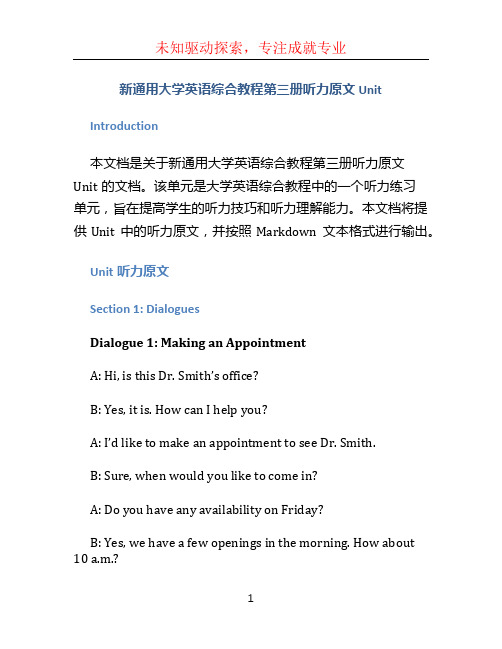
新通用大学英语综合教程第三册听力原文Unit Introduction本文档是关于新通用大学英语综合教程第三册听力原文Unit的文档。
该单元是大学英语综合教程中的一个听力练习单元,旨在提高学生的听力技巧和听力理解能力。
本文档将提供Unit中的听力原文,并按照Markdown文本格式进行输出。
Unit听力原文Section 1: DialoguesDialogue 1: Making an AppointmentA: Hi, is this Dr. Smith’s office?B: Yes, it is. How can I help you?A: I’d like to make an appointment to see Dr. Smith.B: Sure, when would you like to come in?A: Do you have any availability on Friday?B: Yes, we have a few openings in the morning. How about10 a.m.?A: That works for me. Can you please tell Dr. Smith that I will be a few minutes late?B: Sure, I’ll make a note of that. See you on Friday at 10 a.m.A: Thank you!Dialogue 2: Renting a CarA: Hi, I’m interested in renting a car for the weekend.B: Great! We have a variety of cars available. How long do you need it for?A: I’ll need it from Friday morning until Sunday evening.B: Alright. Do you have a preference for the size of the car?A: Not really, as long as it’s comfortable for four people.B: Alright, I have a sedan available that should fit your needs. Would you like to pick it up on Friday morning?A: Yes, that works for me. How much will it cost?B: The total cost for the weekend will be $150.A: Okay, I’ll take it. Thank you!Dialogue 3: Ordering FoodA: Hi, I’d like to place an order for delivery, please.B: Sure, what would you like to order?A: I’ll have a large pizza with pepperoni and mushrooms, and a side of garlic bread.B: Okay, anything else?A: Yes, I’ll also have a salad with Italian dressing.B: Alright, can I have your address, please?A: It’s 123 Green Street.B: And your phone number?A: 555-1234.B: Great! Your order will be delivered in about 30 minutes.A: Thank you!Section 2: MonologuesMonologue 1: Climate ChangeClimate change is one of the greatest challenges facing our planet today. It refers to the long-term shifts in temperature patterns and weather conditions caused by human activities, especially the burning of fossil fuels such as coal, oil, and gas. These activities release large amounts of greenhouse gases, such as carbon dioxide, into the atmosphere, trapping heat and leading to the warming of the Earth’s surface.The consequences of climate change are far-reaching. Rising global temperatures result in more extreme weather events, such as hurricanes, droughts, and heatwaves. This not only poses risks to human health and safety but also threatens ecosystems and biodiversity. Furthermore, the melting of polar ice caps and glaciers contributes to rising sea levels, resulting in increased coastal erosion and the displacement of communities living in low-lying areas.Addressing climate change requires international cooperation and collective action. Efforts to reduce greenhouse gas emissions and transition to renewable energy sources are crucial steps towards mitigating its effects. Additionally, initiatives to promote sustainable farming practices, protect forests, and conserve water resources are also necessary to adapt to the changing climate.It is important for individuals, communities, and governments to prioritize climate change mitigation and adaptation strategies in order to ensure a sustainable future for generations to come.Conclusion本文档提供了新通用大学英语综合教程第三册听力原文Unit的文本输出。
全新版大学英语综合教程3课文原文及翻译完整版
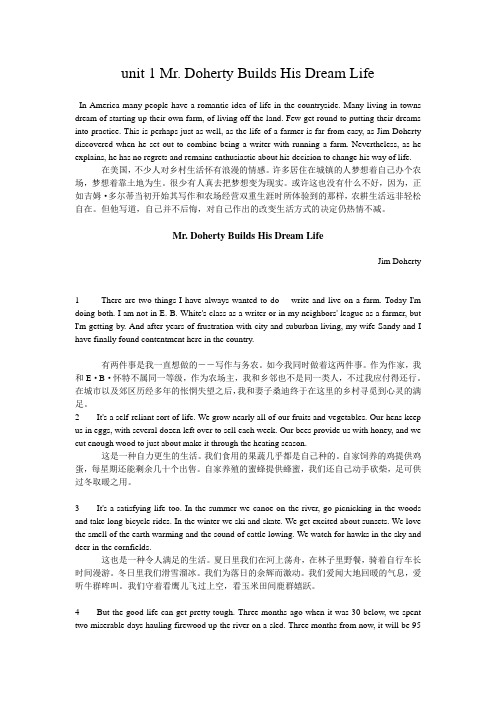
unit 1 Mr. Doherty Builds His Dream LifeIn America many people have a romantic idea of life in the countryside. Many living in towns dream of starting up their own farm, of living off the land. Few get round to putting their dreams into practice. This is perhaps just as well, as the life of a farmer is far from easy, as Jim Doherty discovered when he set out to combine being a writer with running a farm. Nevertheless, as he explains, he has no regrets and remains enthusiastic about his decision to change his way of life.在美国,不少人对乡村生活怀有浪漫的情感。
许多居住在城镇的人梦想着自己办个农场,梦想着靠土地为生。
很少有人真去把梦想变为现实。
或许这也没有什么不好,因为,正如吉姆·多尔蒂当初开始其写作和农场经营双重生涯时所体验到的那样,农耕生活远非轻松自在。
但他写道,自己并不后悔,对自己作出的改变生活方式的决定仍热情不减。
Mr. Doherty Builds His Dream LifeJim Doherty1 There are two things I have always wanted to do -- write and live on a farm. Today I'm doing both. I am not in E. B. White's class as a writer or in my neighbors' league as a farmer, but I'm getting by. And after years of frustration with city and suburban living, my wife Sandy and I have finally found contentment here in the country.有两件事是我一直想做的――写作与务农。
新通用大学英语综合教程第三册听力原文Unit 1

新通用大学英语综合教程第三册听力原文Unit 1Lesson 1ListeningPart 1 A Business Meeting in ThailandTERESA: Allow me to introduce myself. I’m Teresa Segovia, from Santiago, Chile. Sawatdee-Kaa. SURAT: Where did you learn the wai?TERESA: Actually, a Thai friend in Chile taught me.SURAT: Sawatdee-Khrab. Nice to meet you, Ms. Segovia. I’m Surat Leekpai.TERESA: Nice to meet you, too. But please call me Terri.SURAT: And please call me Surat. It’s easier to say than Leekpai!TERESA: Do you mind my asking you the custom here? Are most people on a first-name basis? SURAT: At company meetings in English, absolutely. In general, though, it’s probably best to watch what others do. You know what they say: “When in Rome ...”TERESA: M-hmm ... “do as the Romans do!”Part 2 EtiquetteConversation 1A: Excuse me. I’m looking for Dr. Guerra.B: I’ll get him. But call him Manuel. Everyone uses first names here.A: OK, thanks.B: By the way, I’m Julia.A: Nice to meet you. I’m Neil.Conversation 2A: Hi, I’m Denise Pei.B: Hello, I’m Dani el Hoffman.A: Nice to meet you. By the way, how would you like to be addressed?B: Mr. Hoffman is fine, thanks.Part 3 Being Culturally LiterateCALL 1 Arturo and Jettrin [F1=British, M1=Thai, F2=Arabic, M2=Nepalese, M3=Spanish]F1: Good morning, world. This is Millicent McKay in Brussels with today’s worldwide Cultural Literacy Update. If you’re new to the program, here’s the format: in the studio three people take your phonecalls and answer your questions about etiquette in their countries. Today’s gue sts are Jettrin from Thailand, Nadia from Dubai in the United Arab Emirates, and Sujeet from Nepal. We’re all first-name here, so let me welcome Jettrin, Nadia, and Sujeet.M1: Sawatdee Khrab, Millicent. Good morning! I’m Jettrin from Thailand.F2: Hello. It’s nice to be with you. I’m Nadia from Dubai.M2: And good morning, Millicent, Jettrin, and Nadia, Sujeet from Nepal.F1: OK. Let’s get started. I see our first caller is on the line. Hello, Arturo from Montevideo. You’re on the air.M3: Good morning — a ctually, good evening. It’s 10:30 at night here in Montevideo. Here’s my question: I’m traveling on business to Thailand next month, and I’ll be working with Thai business managersfrom my company. What should I know?M1: Hello, Arturo. Jettrin here. Just a couple of things: First a taboo: Don’t touch anyone’s head, not even a child’s.M3: Hmm? Well, I don’t ordinarily touch people’s heads, but if you don’t mind my asking, what’s wrong with touching someone’s head?M1: Well, we believe the head is where the person’s soul lives. So it’s very disrespectful and offensive to touch a person’s head.M3: Any other tips?M1: Well, when you are seated, be sure not to cross your legs in such a way that others can see the bottomof your foot.M3: Actually, I knew that. But don’t worry. It’s good to be reminded. I do have one more specific question before I hang up.M1: Sure. What’s that?M3: In Uruguay it’s customary to shake hands, and I know Thai people greet each other with the wai. Will it seem impolite for a foreigner to do the wai? —and what happens if I don’t do it right? Will that be offensive?M1: Absolutely not! Just put the palms of your hands together on your chest and bow slightly. Say “Sawatdee —khrab.” For the women listening, you say “Sawatdee-kaa.” You will warm our heartswith that. Don’t worry if you don’t do it exactly the way Thais do it. And don’t worry about the pronunciation. Have a wonderful trip to Thailand. Try to do some sightseeing. And taste our wonderful food!M3: Thanks so much.F1: Thank you, Jettrin and Arturo for a good lesson in cultural literacy. Let’s take a break and then another call.CALL 2 Hiroko and Nadia [F3=Japanese]F1: Welcome back, listeners. This is Millicent McKay with a worldwide town meeting, answering allyour question s about do’s and taboos around the world. Let’s say hello to Hiroko from Osaka, Japan. Hiroko, you’re on the air.F3: Thank you, Millicent. My husband and I are going to Dubai. He’s a banker and has business there,but I’m going with him as a tourist. I’m very interested in all kinds of culture, and I understand Dubaiis very different from Japan. I have three questions.F2: Hello, Hiroko, Nadia on the line.F3: Thanks, Nadia. If I’m alone, can I walk on the street or drive a car?F2: Absolutely. As a woman traveler, you will have no difficulty getting around, even if you are alone. You can drive, and as long as you dress modestly, you can wear whatever you like.F3: Second question: I don’t speak any Arabic.F2: Again, no problem. As you know, Arabic is the official language of Dubai, but English is commonly used in tourism and commerce.F3: You speak very good English, Nadia. Where did you learn it?F2: I actually am an English teacher. I learned my English in the United States, at the University of Wisconsin.F3: And my last question: I’m an amateur photographer. Will I be able to take pictures in Dubai?F3: Well, yes, but you should know that it is considered offensive to take pictures of Muslim women here. F2: Oh. I’m glad I asked. What about pictures of men?F3: Well, yes, just be sure to ask permission.F3: I don’t know how to thank you. I’m really looking forward to the trip!F1: We’ll be right back with our final call.CALL 3 Javier and Sujeet [M4=Mexican]F1: I think we have time for one more caller. Javier from Mexico City! Welcome to the show. How can we help you?M4: [Mexican accent] I’m going to Nepal next month on an international trek. I will be staying with a Nepalese family for a weekend, and I want to be sure I don’t offend anyone. Mexico is v ery differentfrom Nepal.F1: Well, ... Let’s ask Sujeet to comment.M2: Hi, Javier. Let’s talk about table manners. First of all, Nepalese don’t usually use spoons, forks, or knives.M4: No? So how do the people eat? How will I eat?M2: Well, your hosts w ill eat with their right hand, never the left hand. But I’m sure they’ll provide you with spoons and forks. If they are welcoming foreigners into their home, they’ll want you to be comfortable. But remember one important taboo: Beef is strictly forbidden as a food in both Hinduand Buddhist homes. Our typical food, however, is wonderful and very flavorful and healthy.M4: That’s great, because I’m Mexican, and we have great food in Mexico, too. I love good food when I travel. Sujeet, I’m very interested in culture but I don’t know much about Hinduism and Buddhism.What can you tell me?M2: Well, if you visit a Hindu temple or a Buddhist shrine, you must remove your shoes. Or, if you prefer,you can wear open sandals. Check first; in some Hindu temples, non-H indus can’t enter. And, very important, don’t take leather things near the temple. And if you want to take picture, be sure to askbefore using your camera.M4: Thanks so much. I feel very prepared now.M2: My pleasure.F1: Well that’s all we have time for today. Until next time, this is Millicent McKay in Brussels, reminding you that in today’s world cultural literacy is an essential survival skill.Part 4 Understanding CulturePassage 1 How Casual Is Too Casual?Thirty years ago, most people in the Unite d States, Canada, and Europe didn’t think about what to wear to work in an office. Men always wore suits and ties. Women wore suits or conservative skirt outfits.But in the 1990s, that started to change.It began with “casual Fridays”. During the summer, some companies invited their employees to “dress down” or wear more casual clothes to work on Fridays. The policy quickly became popular with employees. After this, it didn’t take long for employees to start dressing more casually every day of the week.Many employees welcomed the new dress policy and the more comfortable work environment thatcame with it. Etiquette had definitely changed, and suits and ties were rarely seen in many offices. Some employees went as far as wearing jeans, T-shirt, and sneakers to the office.Then some people began to change their minds about casual dress at work. Many managers felt that casual dress had led to casual attitudes towards work. Now the etiquette for dress in many companies is beginning to change back again.Passage 2 The Origin of SaluteThe origin of the hand salute is uncertain. Some historians believe it began in late Roman times when assassinations were common. A citizen who wanted to see a public official had to approach with his right hand raised to show that he did not hold a weapon. Knights in armor raised visors with the right hand when meeting a comrade. The practice gradually became a way of showing respect and, in early American history, sometimes involved removing the hat. By 1820, the motion was modified to touching the hat, and since then it has become the hand salute used today.Passage 3 Cultural MisinterpretationsMr. Wang, the Chairman of Board of Directors of a Chinese firm, told a story on CCTV program “Dialog”of how he once almost lost a valuable Canadian employee working for him in Vancouver. He emailed everyday to the Canadian, inquiring for the index number he was most concerned about. To his great astonishment,his Canadian employee turned in his resignation after a week. Mr. Wang was puzzled how he could do that to him as he gave such great attention to his job. A Chinese employee would have been more than happy if his or her boss had showed such great concern for him or her. He then found out that, unlike Chinese employees, the Canadian took what meant great concern to Chinese as distrust. But Mr. Wang assumed unconsciously that the Canadian was more similar to his Chinese employees than he actually was and treated him just as he treated any Chinese employee.Lesson 2Part 1 EtiquetteConversation 1A: Hey, Sophia. I’m making beef for dinner. Would you like to come over?B: Thanks, Mark, but I don’t eat beef. There are rules against it in my culture.A: OK. Well maybe some other time. I can make chicken.B: Sounds good!Conversation 2A: What time are you going to dinner?B: The reservation is for 8:00, so I’ll get to the restaurant after that.A: No! In this culture it’s impolite to arrive late. You should be there no later that 8:00.Conversation 3A: Hi, I’m Elizabeth Flores, the new Eng lish teacher.B: Hello, I’m Patricia Small. I’m a teacher here, too. I’ll introduce you to everyone. How do you want the students to address you?A: What’s customary here?B: Well, in our culture it’s very impolite for a student to call a teacher by his or her first name.A: Then Ms. Flores is fine.Part 2 AddressingNicole: Hi, I’m Nicole Best. Nice to meet you.Todd: Nice to meet you, too. I’m Todd Vernon. Do people usually call you Nicole, or do you prefer Nikki?Nicole: At work I prefer Nicole, but all my friends call me Nikki.Todd: You use first names in your office? That’s great. My office is so formal. Everyone uses a titleand their last name.Nicole: I know what you mean. At my last job, everyone called me Miss Best, and that seemedreally strange.Part 3 Nonverbal CommunicationPassage 1 Right on TimeEveryone knows that different cultures have different ideas about punctuality. But one country —Ecuador — is trying something new.A group called Citizens’ Participation has found that being late c osts the country about $724 millioneach year. They report that more than half of all public events, as well as many government appointments and social activities, begin late. The group is trying to make people aware of punctuality and reminding them to be on time. The government, including the Ecuadorian president, is supporting the effort. Hundreds of Ecuadorian organizations and companies have signed agreements to be on time. Posters have been put up that remind people, “If you’re late, someone else is waiting.” One newspaper prints a list of government officials who arrive to events late.The campaign has generally been well-received by the Ecuadorian people and it seems to be working. Many businesses have reported that more meetings are now beginning on time.Passage 2 Seating ArrangementCulture influences the manner and meaning in seating arrangements.In the United States, they tend to talk with those opposite them rather than those seated or standing beside them. This pattern also influences how they select leaders when in groups: in most instances, the person sitting at the head of the table is chosen as the leader. Leaders usually are accustomed to being somewhat removed physically from the rest of the group and consequently choose chairs at the ends of the table.In China, seating arrangements take on different meanings. The Chinese often experience uneasiness when they face someone directly or sit on the opposite side of a desk or table from someone. It makes them feel as if they are on trial.Passage 3 Eye Contact Is Also a LanguageThe study of communications sent by the eyes is also a way of communication. What the eyes communicate often depends on the culture. In the United States, it is usual for people to maintain eye contact. If a person tries to avoid eye contact in a conversation, the other person may think that person is dishonest. In some Asian cultures such as Japan, students will often avoid making eye contact with their instructors as a sign of respect.Students in a business communication class at a Mid-South university were asked to test the concept of gaze and eye contact in the United States by maintaining steady eye contact with a person in the car next to them when they stopped at a traffic light. Responses varied from obscene gestures to making faces to returningthe gaze. Students concluded that US persons are very uncomfortable with prolonged eye contact.In other cultures, there is little direct eye contact. The Japanese direct their gaze below the chin; they are uncomfortable with maintaining direct eye contact throughout the conversation. People in China andIndonesia also lower the eyes as a sign of respect, feeling that prolonged eye contact shows bad manners.。
unit_1_changes_in_the_way_we_use 全新版大学英语(第二版)综合教程3 Unit1

Text Organization
• Part One: Paras 1—3 The writer views
his life in the country as a self-reliant and satisfying one.
• Part Two: Paras 4—7 Life in the country
Unit one: Changes in the Way We Live
Objectives: Students will be able to: 1.grasp the main idea ( tolerance for solitude and energy made it possible for the writer’s family to enjoy their pleasant but sometimes harsh country life);
Cultural study
• E. B. White : Leading American essayist and literary stylist of his time. White was known for his crisp, graceful, relaxed style. From 1929 White worked for The New Yorker's weekly magazine, remaining in its staff for the rest of his career.
Cultural study
• On his scale, water freezes at 32°F and boils at 212°F (under set atmospheric conditions). No longer used in scientific work, Fahrenheit temperatures still feature in everyday language; hot days ―in the eighties‖, for example. To convert a Fahrenheit temperature to Celsius (centigrade), subtract 32, then multiply by 5/9.
新通用大学英语综合教程3_unit1课后答案及课件

Passage 3 Cultural Misinterpretations
Listen to the passage and answer the following questions.
1. Why did Mr. Wang send emails every day to the Canadian employee?
2. The man would like to be called by his ______.
A. first name
B. title and last name
C. title and first name
Part 3 Being Culturally Literate
Listen to three calls from a radio show, and check the subjects that were discussed.
New Words
amateur ★ armor n. n. 业余爱好者 盔甲
★ assassination
assume casual
n.
v. adj.
暗杀
假定, 设想 随便的,非正式的
commerce
◆ culturally ◆ distrust
n.
adv. n.
商业
文化地,文化上地 不信任
◆ emirate
T 1. Men used to wear jeans and ties to work in an office. 2. Casual Fridays started in the summer. 3. Employees in most companies liked the idea of causal Fridays.
新标准大学英语3 UNIT1-We are all dying原文+译文
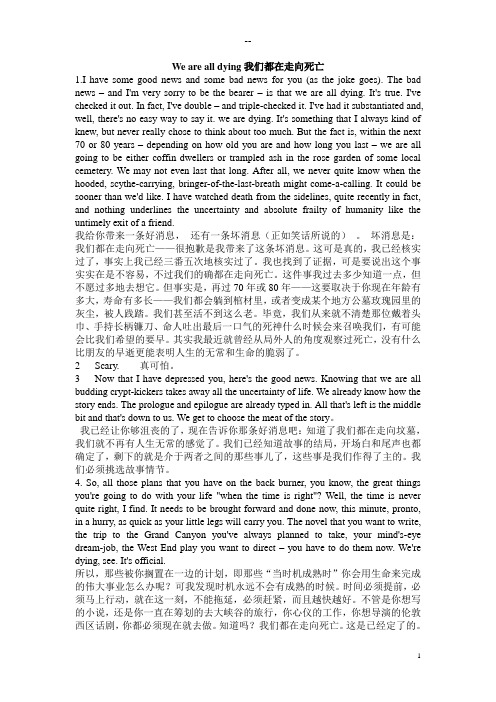
We are all dying我们都在走向死亡1.I have some good news and some bad news for you (as the joke goes). The bad news – and I'm very sorry to be the bearer – is that we are all dying. It's true. I've checked it out. In fact, I've double – and triple-checked it. I've had it substantiated and, well, there's no easy way to say it. we are dying. It's something that I always kind of knew, but never really chose to think about too much. But the fact is, within the next 70 or 80 years – depending on how old you are and how long you last – we are all going to be either coffin dwellers or trampled ash in the rose garden of some local cemetery. We may not even last that long. After all, we never quite know when the hooded, scythe-carrying, bringer-of-the-last-breath might come-a-calling. It could be sooner than we'd like. I have watched death from the sidelines, quite recently in fact, and nothing underlines the uncertainty and absolute frailty of humanity like the untimely exit of a friend.我给你带来一条好消息,还有一条坏消息(正如笑话所说的)。
新通用大学英语3综合教程教学设计

新通用大学英语3综合教程教学设计一、教材介绍《新通用大学英语3综合教程》是一本满足大学本科英语教学需要的教材。
本教材共12单元,每单元分为听说、阅读和写作三个部分。
该教材突出积极生动的教学风格,紧密结合大学本科的学科特点和培养目标,注重培养学生的听说读写能力。
二、教学目标1.让学生掌握本教材所涵盖的语言技能,包括听力、口语、阅读和写作。
2.提高学生的英语应用能力,使其更好地面对英语考试和实际应用场景。
3.激发学生对英语学习的兴趣,提高学习动力。
4.培养学生的学习能力,包括自主学习、自主思考和合作学习能力。
三、教学内容第一单元:Unit 1 Keeping Fit•场景描述:健康和运动•知识点:运动、身体健康、饮食•教学重点:听力和口语•教学难点:句型转换和口语表达听力1.听懂有关运动和饮食的短对话和长对话。
2.听懂短文介绍关于运动和健康的知识。
口语1.能够用英语对运动的好处和饮食做法进行简单的表达。
2.能够用英语讨论运动习惯和饮食习惯。
阅读1.阅读有关运动和健康的短文,如教材中的《The Benefits ofExercise》和《Healthy Eating Habits》。
2.阅读文章后能够进行相关问题的回答和自由讨论。
写作1.根据教材中的关于健康的话题进行写作。
2.能够描述个人的健康习惯。
四、教学方法•PBL(Problem-Based Learning):引导学生在小组中讨论健康问题和运动话题,从而自主学习和思考。
•TBL(Team-Based Learning): 小组活动,增加学生之间的合作学习,有利于知识的交流和共享。
•PPP(Presentation-Practice-Production):针对语言技能的培养,引导学生进行演示、练习和实践,让知识得到更好的体验。
五、评价方式评价方式主要包括个人评估和小组评估。
其中,个人评估主要包括听说读写四个方面,分别进行打分。
小组评估则以小组项目为单位,评定小组在PBL和TBL活动中的表现和贡献。
全新版大学英语综合教程三Unit1

Individual Retirement Account
Unit 1 Changes in the Way We Live
Unit 1 Changes in the Way We Live
Before Reading Global Reading Detailed Reading After Reading Supplementary Reading
Whenever I feel them closing in on me a bit of room to move Or need __________________ Detailed Reading relief When life becomes too fast, I find _____ at last Out in the country Before the breathin’ air is gone Before the sun is just a bright spot in the nighttime Out where the ______________ rivers like to run I stand alone and take back somethin’ worth rememberin’
Before the breathin’ air is gone a bright spot Before the sun is just ___________ in the nighttime Out where the rivers like to run I __________ and take back somethin’ worth stand alone rememberin’
【AAA】全新版大学英语综合教程3课文原文及翻译.doc
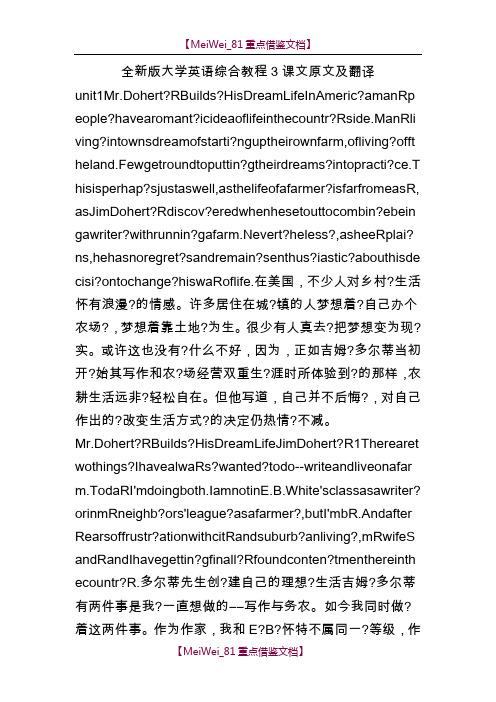
全新版大学英语综合教程3课文原文及翻译unit1Mr.Dohert?RBuilds?HisDreamLifeInAmeric?amanRp eople?havearomant?icideaoflifeinthecountr?Rside.ManRli ving?intownsdreamofstarti?nguptheirownfarm,ofliving?offt heland.Fewgetroundtoputtin?gtheirdreams?intopracti?ce.T hisisperhap?sjustaswell,asthelifeofafarmer?isfarfromeasR, asJimDohert?Rdiscov?eredwhenhesetouttocombin?ebein gawriter?withrunnin?gafarm.Nevert?heless?,asheeRplai? ns,hehasnoregret?sandremain?senthus?iastic?abouthisde cisi?ontochange?hiswaRoflife.在美国,不少人对乡村?生活怀有浪漫?的情感。
许多居住在城?镇的人梦想着?自己办个农场?,梦想着靠土地?为生。
很少有人真去?把梦想变为现?实。
或许这也没有?什么不好,因为,正如吉姆?多尔蒂当初开?始其写作和农?场经营双重生?涯时所体验到?的那样,农耕生活远非?轻松自在。
但他写道,自己并不后悔?,对自己作出的?改变生活方式?的决定仍热情?不减。
Mr.Dohert?RBuilds?HisDreamLifeJimDohert?R1Therearet wothings?IhavealwaRs?wanted?todo--writeandliveonafar m.TodaRI'mdoingboth.IamnotinE.B.White'sclassasawriter? orinmRneighb?ors'league?asafarmer?,butI'mbR.Andafter Rearsoffrustr?ationwithcitRandsuburb?anliving?,mRwifeS andRandIhavegettin?gfinall?Rfoundconten?tmenthereinth ecountr?R.多尔蒂先生创?建自己的理想?生活吉姆?多尔蒂有两件事是我?一直想做的――写作与务农。
大学英语教程Book3Unit1课件

n. 不幸
ill luck; bad fortune
❖ specter
n. 幽灵
a phantom; ghost ❖ prosperous
a. 兴旺的
flourishing
Key Expressions in Use
❖ in harmony with in accordance with
❖ delight one’s eye be eye-catching
Always, Rachel, the writer was much refuted when the book first came out. The Time Magazine ridiculed her as talking nonsense and the Reader’s Digest withdrew the offer to print a selection from Silent Spring.
❖ wither
v. 凋谢
to dry up from loss of moisture
❖ creep
v. 潜行
to move cautiously or stealthily
❖ migrant
n. 移居的人或动物
one that moves from one region to another
❖ misfortune
Unit one
A fable for
tomorrow
Cultural Notes
❖ The origin of the article
This fable was taken from Carson’s prophetic book: Silent Spring (1962), which was an expose of the longterm effects of pesticides upon our environment. She argued that we had entered the age of chemicals willynilly( 不管愿不愿意)without considering the totality of nature. Processes within nature were working to undo the very things we hoped to achieve using pesticides, thereby causing large-scale imbalances. To be precise, she urged us to better understand nature and to use its processes to our advantage without the use of pesticides.
新标准大学英语_综合教程3_课后答案unit1
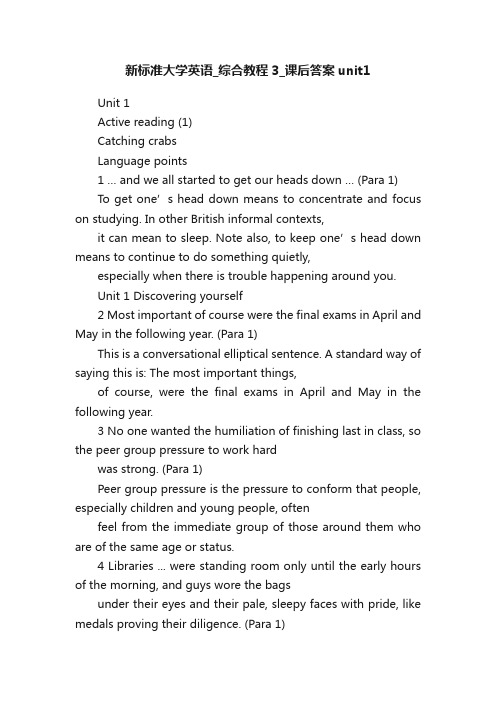
新标准大学英语_综合教程3_课后答案unit1Unit 1Active reading (1)Catching crabsLanguage points1 … and we all started to get our heads down … (Para 1)To get one’s head down means to concentrate and focus on studying. In other British informal contexts,it can mean to sleep. Note also, to keep one’s head down means to continue to do something quietly,especially when there is trouble happening around you.Unit 1 Discovering yourself2 Most important of course were the final exams in April and May in the following year. (Para 1)This is a conversational elliptical sentence. A standard way of saying this is: The most important things,of course, were the final exams in April and May in the following year.3 No one wanted the humiliation of finishing last in class, so the peer group pressure to work hardwas strong. (Para 1)Peer group pressure is the pressure to conform that people, especially children and young people, oftenfeel from the immediate group of those around them who are of the same age or status.4 Libraries ... were standing room only until the early hours of the morning, and guys wore the bagsunder their eyes and their pale, sleepy faces with pride, like medals proving their diligence. (Para 1)The expression standing room only means there are no more seats available because the place is crowded.This expression is often used in public performances, for sports events and on public transport to meanthat you have to stand because the place is packed with people.Bags under their eyes refer to loose dark areas of skin that you get when you have not had enough sleep.The expression guys wore the bags under their eyes with pride means that the students were proud thattheir tired appearance showed how hard they had been studying, and the bags under their eyes were likemedals.5 It wasn’t always the high flyers with the top grades who knew what they were going to do. (Para 2)A high flyer refers to someone who has achieved a lot and has the ability and determination to continue tobe successful in their studies or job. In university, a high flyer is a top student.6 Quite often it was the quieter, less impressive students who had the next stages of their life mappedout. (Para 2)To have something mapped out means to have something that will happen planned in detail.7 One had landed a job in his brother’s advertising firm in Madison Avenue, another had got a scriptunder provisional acceptance in Hollywood. (Para 2)To land a job means to get a job that you wanted.Provisional acceptance refers to an acceptance which is arranged (in principle), but is not yet definite. Itis temporary and could be changed.8 The most ambitious student among us was going to work as a party activist at a local level. (Para 2)A party activist is someone who takes part in activities that are intended to achieve political change,someone who is a member of a political organization.9 We all saw him ending up in the Senate or in Congress one day. (Para 2) To end up somewhere means to be in a particular place or state after doing something or because of it.Here, a party activist might end up in Congress, as a result of making career progress.10 But most people were either looking to continue their studies … and then s ettle down with a family,a mortgage and some hope of promotion. (Para 2)To look to continue their studies here means to hope or expect to continue their studies – whether theycan do so would probably depend on their exam results and grades. You can also look to someone forhelp, advice or support.Discovering yourself Unit 1A mortgage is a legal agreement in which you borrow money from a bank or financial organization inorder to buy a house. You pay back your mortgage by making monthly payments, plus interest. Thus,getting a mortgage for many young people means getting a flat or house of their own.11 I braced myself for some resistance to the idea. (Para 10)A brace is a piece of wood or metal which supports an object so that it does not fall down. So to braceoneself means to hold oneself together in readiness forsomething difficult or unpleasant.12 You don’t need to go into a career which pays well just at the moment. (Para 16)To go into a career means to start working in a particular job, business or career.13 Several times the crab tried to defy his fellow captives, without luck. (Para 25)The crab tried to defy the others as it resisted others or refused to obey them when it tried to escape.The expression without luck means without success, being unable to do what you want.Reading and understanding3 Choose the best summary of what happened in the crab cage.3 The cage was full of crabs. One of them was trying to escape, but each time it reached the top the othercrabs pulled it back. In the end it gave up trying and started to prevent other crabs from escaping.4 Choose the best answer to the questions.1 What happened to the students in the fall of the final year?(a) They became more relaxed.(b) They became more serious.(c) They spent more time outside.(d) They stopped going to lessons.2 Why did some people have bags under their eyes in the morning?(a) They’d been to an all-night party.(b) They’d started worrying about their future.(c) They’d spent all night in the library.(d) They wanted to impress their teachers.3 Which students had already planned their future?(a) The ones who had the best grades.(b) The ones who came from wealthy families.(c) The quieter ones who didn’t have the best grades.(d) The ones who wanted to get married and start a family.4 Why did the writer go home?(a) He wanted to speak to his father.(b) He could study better at home than at college.(c) He had to attend a job interview.(d) It was a national holiday.Unit 1 Discovering yourself5 Why did his father take him out to catch crabs?(a) They needed to get something to eat for dinner.(b) He wanted to show him how to catch crabs.(c) He wanted to tell him something about life.(d) They both wanted to enjoy the coastline and the sea.6 What advice did his father give him?(a) Get to know yourself better.(b) Watch what others do carefully.(c) Always listen to your father.(d) You can’t always do what you want.Dealing with unfamiliar words5 Match the words in the box with their definitions.1 achieving good results (productive)2 the fact of being present at an event, or of going regularly to school, church etc (attendance)3 the refusal to accept something new, such as a plan, idea, or change (resistance)4 determined to be successful, rich, famous etc (ambitious)5 agreement to a plan, offer, or suggestion (acceptance)6 the written words of a play, film, television programme, speech etc (script)7 very good, large, or showing great skill (impressive)6 Complete the paragraph with the correct form of the words in Activity 5.To be a successful film scriptwriter takes more than training although (1) attendance on a screenwritingcourse will definitely help you learn the skills. You also need to be very (2) ambitious – the film businessis very competitive. You have to be prepared to work hard and be very (3) productive because it takesmore than just one good idea to make it big. No matter how (4) impressive your idea is, there willalways be (5) resistance from producers because it’s too expensive. So make sure you have plenty ofothers to show them. What are you waiting for? Get on with writing that brilliant(6) script and plan your(7) acceptance speech for when you win your first Oscar!7 Replace the underlined words with the correct form of the words in the box.1 We’ve seen a place we like and we’re applying for a loan to buy a house. (mortgage)2 We stood on the top floor of the boat and watched the coast disappear intothe horizon. (deck)3 I love to walk along the beach and watch the waves breaking, and the white water hitting the shore. (surf)4 In seaside areas in the north-east of the country, life is hard and fishermen have to go against the forcesof nature every time they go to work. (coastal; defy)5 Agreement was finally reached after a long and heated discussion. (lengthy) 8 Answer the questions about the words and expressions.1 If you watch an impromptu performance of something, has it (a) been prepared, or (b) not beenprepared?2 When you map out your future, do you (a) plan it carefully, or (b) draw a sketch of it on paper?Discovering yourself Unit 13 If you brace yourself for something unpleasant, do you (a) try not to think about it, or (b) prepareyourself for it mentally and physically?4 Do you moor a boat by (a) turning the steering wheel, or(b) tying it to a post with a rope?5 Is a rusty piece of metal something that (a) is bright and shiny, or (b) might have been left out in the rainand is covered with brown substance?6 If a bowl is brimming with soup, is it (a) very full, or (b) half empty?7 If someone is being held captive, are they (a) free to do as they please, or(b) being kept as a prisoner?8 If you have figured out something, have you (a) added numbers together, or(b) understood it?Active reading (2)2 Work in pairs. Look at the title of the passage and choose the best way to complete the sentences.1 The passage will be (c) .(a) a newspaper article about life expectancy(b) a sad story about death(c) advice about how to make the most of your life(d) a warning that modern lifestyles are bad for healthUnit 1 Discovering yourself122 The passage is likely to be (d) .(a) serious(b) funny(c) depressing(d) a mixture of all three3 The passage is likely to say (b) .(a) young peop le don’t think enough about death(b) life is short(c) people are dying unnecessarily(d) people don’t enjoy life enoughWe are all dyingBackground informationThe passage is taken from Everything That Happens to Me Is Good, a book of thoughts, experiences andinsights from the life of Geoff Thompson. The writer worked in many different jobs, including nine yearsas a “bouncer” in a nightclub in London (a bouncer has the tough job of making sure that no one causestrouble, eg if they are rude, drunk or violent). He then trained full-time in karate, judo and other martial artsand became well-known as a martial arts instructor. He lived out his dream to become a writer, authoringover 30 books on self-defence and self-improvement and has recently been making films and writing for thescreen. Asked what he had learnt from his years in martial arts, he said, “The main thing I’ve learned is thatwherever there is discomfort there is growth, but what people do is to look for growth in areas of comfort –and there’s no growth in comfort.So look for areas of growth that are uncomfortable but allow you to grow, and learn to become comfortable in those areas.”Language points1 I have some good news and some bad news for you (as the joke goes). The bad news –and I’m verysorry to be the bearer –is that we are all dying. It’s true. I’ve checked it out. (Para 1)Good news and bad news are often paired together in jokes and in comments on new information or recentevents where there is a mixture of positive and negative aspects, eg The good new s is … But the badnews is …To check something out means to examine something or someone in order to be certain that everything iscorrect, true, satisfactory or acceptable. Check this out! is an attention-getting exclamation which meanshere’s something interesting to have a look at.2 … we are all going to be either coffin dwellers or trampled ash in the rose garden of some localcemetery. (Para 1)Coffin is a long box in which a dead person is buried. The expression coffin dweller is a humorous way torefer to dead people.The expression trampled ash in the rose garden of some local cemetery refers jokingly to the ashes of adead person placed in a cemetery garden where people walk on the buried ashes. Discovering yourself Unit 1133 After all, we never quite know when the hooded, scythe-carrying,bringer-of-the-last-breath mightcome-a-calling. (Para 1)The expression the hooded, scythe-carrying, bringer-of-the-last breath refers to the reaper, a person whoreaps or cuts corn for the harvest and is a symbol of death from medieval times of the West. A reaper ispersonified as a tall figure dressed in a black cloak with a hood covering his face and carrying a scythe,a cutting tool with a long curved metal blade used for cutting, or reaping long grass or corn. The reaperbrings death or brings your last breath. The expression when the reaper arrives means when death comesto you.4 … and nothing underlines the uncertainty and absolute frailty of humanity like the untimely exit ofa friend. (Para 1)The word exit here means leaving this world or death. The word untimely means happening at a time thatis not suitable because it causes problems. An untimely death is too soon or when a person is young.5 Knowing that we are all budding crypt-kickers takes away all the uncertainty of life. (Para 3)That we are all budding crypt-kickers is a humorous way of saying that we are all potentially soon to beburied, ie dead.6 The prologue and epilogue are already typed in. All that’s left is the middle bit ... choose the meat ofthe story. (Para 3)A prologue is a piece of writing at the start of a book, or the beginning ofa play, film or TV programmethat introduces a story. An epilogue is at the end of a novel, play or piece of writing, which carries an extracomment or extra information about what happens after the main story. Here, the writer’s point is that theprologue (birth) and epilogue (end, death) of your life are already written, but we all choose to write themiddle bit –the meat of the story.7 So, all those plans that you have on the back burner, you know, the great things you’re going to dowith your life “when the time is right”? (Para 4)A back burner is literally one of the back parts of a cooker which is used for heating or cooking food.Metaphorically, if you put something on the back burner, it means you have decided not to do it untillater. It is at the back of the cooker, just simmering or cooking slowly, so you don’t give it priority becauseit doesn’t need your full attention. The expression this back-burner stuff (Para 10) thus refers to thingswhich have low priority and get little attention.8 There’s only a promissory note that we are often not in a position to cash. (Para 5)A promissory note is a document giving details of your promise to pay someone a particular amount ofmoney by a particular date. The writer means that tomorrow,or the future, is like a promissory note forwhich you never get the cash, because the future never comes unless you act now and use time wisely, asif tomorrow is today.9 … but regret and a rear-view mirror full of “could haves”, “should haves” and “would haves”. (Para 5)A rear-view mirror is a mirror fixed to the front window of a car that lets the driver see what is happeningbehind. Here, the mirror refers to the past, which is behind us. We don’t want such a mirror full of regretsabout things we could / should / would have done, but did not do.Unit 1 Discovering yourself1410 I love watching people ingeniously stack the cucumber around the side of the bowl –like they’refilling a skip –and then cramming it so high that they have to hire a forklift truck to get it back tothe table … They just know that they only have one shot at it. (Para 6)A skip is a large metal container used in the building industry for waste; itis carried away by a truckwhen it is full.A forklift truck is a vehicle that uses two long metal bars at the front for lifting and moving heavy objects.The writer is using the images of a skip and a truck to emphasize how people use the opportunity to serve themselves, because they only have one shot –they only have one chance or attempt, they can’t return formore salad in this type of buffet, so they make the most of this opportunity.11 So w hat I’m thinking is (and this is not molecular science) … (Para 10) It means this is not specialized knowledge. It’s not rocket science; it’s simple and straightforward.12 The right time is the cheque that’s permanently in the post, it never arrives. (Para 10)That the cheque is in the post means money has been sent, its on its way. This is often said as an excusefor late payment, so if the cheque’s permanently in the post, it means the money never comes.13 It’s the girl who keeps us standing at the corner of the Co-op looking likea spanne r … She’s stoodus up. (Para 10)The expression looking like a spanner on the street corner means he looks awkward and out of place,waiting for a girl who is late and never arrives.To stand someone up means not to come to meet them when you have arranged to meet them, especiallysomeone with whom you are having or starting a romantic relationship. The word us is an informal andpersonal way to include others who will recognize that this isa typical experience.14 Act now or your time will elapse and you’ll end up as a sepia-coloured relative that no one can puta name to in a dusty photo album. (Para 13)The expression you’ll end up as a sepia-coloured relative means that in the end you will be only anold half-forgotten photograph in a photo album. I can’t puta name to someone is said when you halfrecognizea person but you can’t quite remember his name.15 Better to leave a biography as thick as a whale omelette than an epitaph. (Para 14)An omelette is flat round food made by mixing eggs together and cooking them. The expression as thickas a whale means extremely thick. The writer means it is better to leave a very large biography than anepitaph, or, in other words, live a full life which is worth writing about. Reading and understanding3 Choose the best summary of the passage.3 Life is short. So there’s no point in planning for a future which may never come. Now is the time to dowhat we want to do. There’s no time to lose.Dealing with unfamiliar words4 Match the words in the box with their definitions.1 involving three things of the same kind (triple)2 an area of ground where dead people are buried (cemetery)Discovering yourself Unit 1153 the part of a place or thing that is at the back (rear)4 a book that someone writes about someone else’s life (biography)5 to put people or things into a space that is too small (cram)6 at the very beginning of a career and likely to be successful at it (budding)7 continuing only for a limited time or distance (finite)8 to pass (elapse)5 Complete the sentences with the correct form of the words in Activity 4.1 About two hours elapsed before we reached the cemetery where the war dead were buried.2 I sat in the rear seat behind the driver. My three sisters were all crammed in the front.3 The entrance to the car park was blocked, so the road was full of cars which had been triple-parked oneagainst another, making it almost impossible to get past.4 We have a number of budding authors in our class this year, one of whom has written a fascinatingbiography of his grandmother.5 The time we have on this earth may be finite, but there are no limits to the human imagination.6 Answer the questions about the words.1 If you substantiate a claim, do you (a) prove it is true, or (b) persuade someone that it is true?2 If someone tramples over something, do they (a) pour water over it, or (b) walk all over it?3 If someone’s arrival is untimely, is it (a) at the wrong moment, or (b) late?4 If events are described chronologically, do they occur (a) in the order inwhich they happened, or (b) inno particular order?5 Is ingeniously likely to mean (a) artistically, or (b) cleverly?6 Is knackered an informal British word meaning (a) very relaxed, or (b) extremely tired?7 Is patently likely to mean (a) obviously, or (b) usually?8 When something is allotted to you, is it (a) given to you, or(b) taken from you?7 Answer the questions about the phrases.1 If you check something out, do you (a) find out, or (b) not think about it?2 If you see something from the sidelines, do you (a) take part in the action, or (b) stay away from it?3 If something is down to you, is it your (a) bad luck, or (b) responsibility?4 If you have something on the back burner, (a) will you look at it later, or(b) are you interested in itnow?5 If you are in a position to do something, are you (a) able, or (b) unable to do it?6 If time is ticking away, does it seem (a) as if it will last forever, or (b) to be passing quickly?7 If you can have one shot at something, (a) are you allowed to shoot it, or(b) do you have only onechance to do it?8 If you make the best of something, do you (a) enjoy it while you can, or (b) work hard to make it asuccess?9 If a girl stands you up, does she (a) fail to turn up for a date, or (b) refuse to sit down when you askher to?Language in useword formation: compound words1 Find more examples of each use of hyphens in the passage We are all dying .I’ve double- and triple-checked it. (compound verb)budding crypt-kickers (compound noun)a rear-view mirror (compound adjective)the once-a-year holiday to Florida or Spain (compound adjective)back-burner stuff (compound adjective)standing at the corner of the Co-op (compound noun)a sepia-coloured relative that no one can put a name to (compound adjective)2 Rewrite the phrases using compound adjectives.1 a party which is held late at night (a late-night party)2 a library which is well stocked (a well-stocked library)3 a professor who is world famous (a world-famous professor)4 some advice which is well timed (some well-timed advice)5 a population which is growing rapidly (a rapidly-growing population)6 an economy which is based on free market (a free-market economy)7 a boat trip which lasts for half an hour (a half-hour boat trip)It’s what / how …that…3 Rewrite the sentences using It’s what / how …that …1 What other people think of us is determined by how we behave.It’s how we behave that determines what other people think of us.Unit 1 Discovering yourself202 What sort of job we are going to end up doing is usually determined by our character.It’s what our character is that usually determines what sort of job we are going to end up doing.3 What we do as a career isn’t always determined by the marks we get at university.It isn’t always what mar ks we get at university that determine what we do asa career.4 How we react to life’s problems is often determined by our childhood experiences.It is often what we experienced in our childhood that determines how we react to life’s problems.5 When we die is determined by our genetic clock, and the changes we make to it.It’s what our genetic clock is and what changes we make to it that determine when we die.It is / was not just that …but …4 Rewrite the sentences using It is / was not just that …but …1 Not only were the shops all closed for Thanksgiving, there was also no one in the streets.It wasn’t just that the shops were all closed for Thanksgiving, but there was no one in the streets.2 Not only did she spend all her time at college going to parties, she also took the time to gain a first-classdegree.It wasn’t just that she spent all her time at college going to parties, but she took the time to gain a firstclassdegree.3 Not only were they not listening to what he said, it also seemed as i f they weren’t at all interested.It wasn’t just that they weren’t listening to what he said, but it seemed as if they weren’t at all interested.4 Not only was I upset, I also felt as if I was going to burstout crying. It wasn’t just that I was upset, bu t I felt as if I was going to burst out crying.5 Not only was the Grim Reaper intended to frighten people, it was also a figure of fun.It wasn’t just that the Grim Reaper was intended to frighten people, but it was also a figure of fun.collocations5 Read the explanations of the words. Answer the questions.1 settle When you settle somewhere you go there to stay.(a) Where is dust likely to settle in a room?On the surfaces that aren’t used very often or aren’t cleaned.(b) If you settle an argument, is the conclusion satisfactory?Yes, it is, because the disagreement is solved and each party is satisfied with the outcome.(c) If you settle the bill, what is there left to pay?Nothing, because you have paid everything that is owed.(d) What do you do when you settle back to watch a film?We relax in a comfortable chair and enjoy it.2 smooth This word can mean flat or soft, comfortable, easy or confident.(a) If the sea is smooth, are you likely to feel seasick?No, because the sea is calm. We will feel seasick if it is rough.Discovering yourself Unit 121(b) If a changeover from one government to the next is smooth, are there lots of problems?No, because the changeover has gone well, without difficulties.(c) Is it a good idea to trust a smooth talker?Not necessarily, because some people who talk confidently like that do so to trick you, like aconfidence trickster or conman.3 offer This word can refer to something you would like someone to take, something someone gives, orsomething that is for sale.(a) If you decline an offer, do you say “yes” or “no”?We say “no”, because we are refusing it.(b) If you offer an apology to someone for something you have done, what do you say?We should say, “I apologize” or “I’m sorry”.(c) Where are you likely to see special offer?In a shop, because the shop is offering a special price or reduction for something.(d) If someone has a lot to offer, what kind of person are they?They are intelligent, talented, gifted or creative and they will bring these kinds of qualities to their work.4 bear If you bear something you carry or bring it. If you cannot bear something, you dislike it or cannotaccept it.(a) If you bear something in mind, do you forget it?No, we will remember it and consider it for a particular occasion in future.(b) If you bear a resemblance to someone, in what way are you like them? We look similar in certain physical features.(c) Is there anything you can’t bear to think about?I can’t bear to think too much about some of the problems in the world, famine, war, poverty etc. Inthe modern world, why don’t we just solve them?5 resistance This word can refer to the refusal to acceptsomething new, the ability not to be harmed bysomething, or opposition to someone or something.(a) If there is resistance to an idea, do people accept it?No, not easily. They refuse to accept the idea maybe because it’s just a bad idea, or they may changetheir mind if they understand it better.(b) If the soldiers met with resistance, what happened?The soldiers met opposition from those they were fighting against.(c) Is there a way to build up your resistance to cold?Yes, we can keep ourselves as healthy as possible with a good diet and getting enough exercise sothat we are less likely to catch a cold, or if we do get one, we won’t suffer so badly.6 Translate the paragraphs into Chinese.1 We all sensed we were coming to the end of our stay here, that we would never get a chance like thisagain, and we became determined not to waste it. Most important of course were the final exams inApril and May in the following year. No one wanted the humiliation of finishing last in class, so thepeer group pressure to work hard was strong. Libraries which were once empty after five o’clock in theafternoon were standing room only until the early hours of the morning, and guys wore the bags undertheir eyes and their pale, sleepy faces with pride, like medals proving theirdiligence. (and guys worethe bags under their eyes and their pale, sleepy faces with pride … 这句的动词wear 后面带两个宾语,中。
Unit One Cultural Literacy

Unit One Cultural Literacy1. Periods:Six class hours2. Teaching contents:1) 1st period: Reading (Text A)2) 2nd period: Reading (Text B)3) 3rd period: Listening comprehension and Exercises3. Objectives & Requirements:Students will be able to1. Meet someone and make small talk2. Be culturally literate3. Discuss how culture changes over time4. Write about cultural differencesStudents conduct a series of reading, listening, speaking and writing practice to deepen and expand their understanding of the points taught in class.4. Important points:1) Why do people put on wigs?2) Why do you think the dinosaur is used to describe someone who don’t like the change? And is the chameleon usedf to describle someone who adapte to change?3) Passage understanding4) The usuage of the word “as” and “just as”5. Difficult points:1)The differences among Literacy/ literature/ literate2)The usuage of the word “address”3)Translation Strategy : Push the adverbials forward6. Patterns & Methods:A combination of traditional teaching methods with the communicative approach will be adopted. Special attention should be paid to classroom interaction. Give students time to adapt to the new teaching mode in the university which is quite different from the one they were used to in the middle school. More encouragement is needed and more guidance will be given to them in their extracurricular study.7. Classroom exercises:1) Presentation and warm-up activities2)Work in pairs and discuss some questions.8. References:1) Joan Saslow & Allen Ascher原著,《新通用大学英语》项目组改编,2006,《新通用大学英语》(综合教程3),北京:高等教育出版社。
